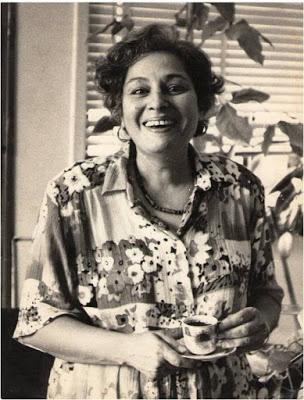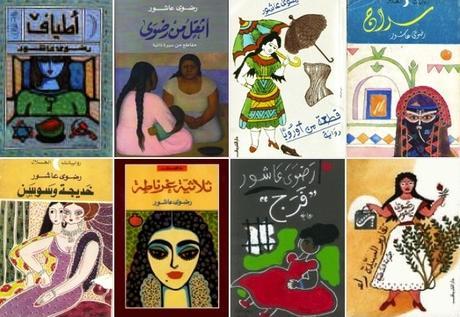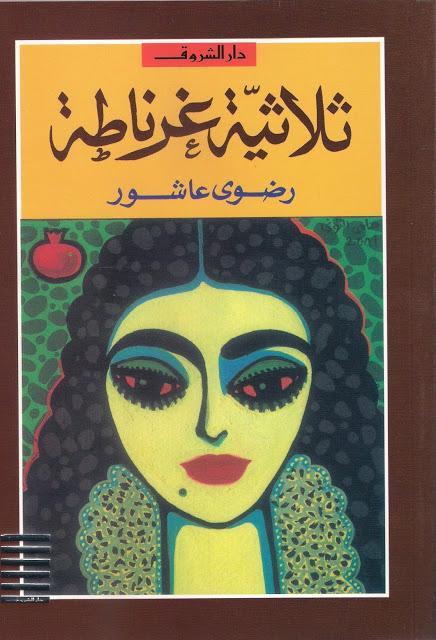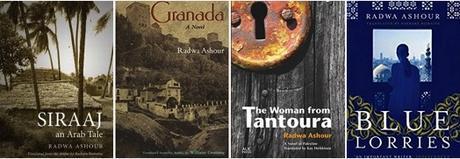I renounced writing. I said that I was no good, and my resolution hit home as sharply and as decisively as a guillotine. Several years passed and then all of a sudden, I found that writing reappeared with an insistent, importuning presence.That was Egyptian writer, activist and professor of American and English literature Radwa Ashour writing about her experience with writing in a 1993 issue of Alif journal. It was from a testimony presented earlier at a conference in 1988.

Radwa Ashour in her office at the Department of English at Ain Shams University in 1993
Source: arablit.org
To read Ashour's struggles with writing is extremely heartening considering Ashour is perhaps one of the most influential writers in the Arab region, who has written numerous books: seven novels, an autobiography, two collections of short stories and five criticism books. There's also a major 4-volume work on Arab women writers, she co-edited in 2004 (there is also an abridged English edition of the original Arabic version) and works that Ashour co-translated from English to Arabic (Volume 9 of The Cambridge History of Literary Criticism). Ashour also won numerous awards including the 2007 Constantine Cavafy Prize for Literature and the 2011 Owais Prize.
Born in Cairo in 1946, Radwa Ashour came from 'a literary and scholarly family' as written in the Guardian:
... her father, Mustafa Ashour, was a lawyer but had strong literary interests, while her mother, Mai Azzam, was a poet and artist. Radwa evoked in her writing how she was raised to recite the poetic corpus of Arabic literature by her grandfather Abdelwahab Azzam, a diplomat and professor of oriental studies and literature at Cairo University, who first translated the classic Persian Book of Kings (Shahnama) into Arabic, as well as other Oriental classics.
Ashour got a B.A. in English in 1967 and M.A in comparative literature in 1972 - both from Cairo University, before receiving a PhD in African-American literature from the University of Massachusetts at Amherst in 1975. Her dissertation was titled 'The Search for a Black Poetics: A Study of African-American Critical Writings'.
Following her doctorate, Ashour returned to Cairo and tool a position at Ain Shams University - becoming a professor of English and comparative literature in 1986 and the head of department of English language and literature from 1990 to 1993.A bibliography of Radwa Ashour's works in English can be found on
ArabLit, but Ashour's first book was a memoir, and of her experience doing a PhD on African American Literature in the United States in the 70s. It was written when her 'writing reappeared' and published in 1983. Writing's 'insistent, importuning presence' continued and her first novel, Warm Stone, was published in 1985.
Some of Radwa Ashour's Books in Arabic. Cover images via Goodreads
In 1992, Siraaj, An Arab Tale was first published in Arabic (and translated into English in 2007). In her introduction for the English edition of Siraaj Barbara Romaine writes that one of the unique aspects of the novel is that it depicts something 'rare in Arabic literature ... the practice of slavery within Arab societies'. As further explained by Barbara Romaine:
The novel tells the story of two late-nineteenth-century thwarted rebellions: a fictional uprising on an imagined island in the Indian Ocean, and Ahmed Orabi's historic - albeit ultimately unsuccessful - revolt against the khedive of Egypt ... The setting of the main plot is the aforementioned island, located in imagination off the east coast of Africa, with an Arab sultan who rules over a population consisting of Arab labouring poor and enslaved Africans. The subplot concerning the character Said and his journey is told in the context of the bombardment of Alexandria in 1882, culminating in Orabi's defeat and the British occupation of Egypt.Perhaps Ashour's most famous work is the Granada Trilogy - with Part 1 Granada voted in 2011 as one of the best 105 Arab books of the 20th century by the Arab Writers Union. Granada also won the Cairo International Book Fair Book of the Year Award in 1994, while The Trilogy won the First Prize of the First Arab Woman Book Fair in 1995. While the Trilogy has been translated into Spanish, (as far as I am aware) only Part 1 has been translated into English.

Cover of Granda Trilogy illustrated by Egyptian painter and illustrator, Helmi al Touni in 2001
'Granada' is a work of historical fiction set in the aftermath of the Castilian takeover of the Islamic kingdom Granada in 1942. It tells the story of an extended family grappling with the consequences of that political catastrophe for the Muslim community.Ashour's other novels (in English) includes The Woman from Tantoura, following the life of a young girl from her days in the village of al-Tantoura in Palestine up to the dawn of the new century; Spectres which tells the story of two women born on the same day and their lives; and Blue Lorries - centred Nada - a woman whose life has been filled with protests and political activism. The political activism in most of Ashour's books stems from the fact that she was also vey politically active throughout her life - she founded the National Committee Against Zionism in Egyptian Universities, and towards the end of her life, was a founding member of the March 9 Movement for the independence of Egyptian universities. Her writing was also often used to champion human rights and to challenge the dominant discourse.

Some of Radwa Ashour's books in English.
Passing away in 2014 in Cairo, Ashour's last work, Al-Sarkha (I've seen it translated as both 'The Cry' and 'The Scream') is part two to Heavier than Radwa. Both books are described as:... a compact amalgam weaved with rare sensitivity, recording her triumphant journey through illness, where she underwent a number of surgeries to remove the brain tumour, in December 2010 and in February 2013. The details of the horrifying series of surgical operations intersect with events of the Egyptian revolution, which broke out while she was in a hospital in Washington, DC.
Published, after she had passed away - on what would have been her birthday - a review of the second part notes:
... the published text of 'The Cry' isn't the final draft. The author didn't finalise the book and there are some blank pages and headnotes or chapter titles the author wished to tackle but didn't arrive to. She stopped writing when the illness intensified in September 2014.A truly remarkable writer, academic, translator and political activist, Ashour's writing not only reflected her own gendered experience and national identity: 'As a woman and as a person in Egypt, in a third world country ... this is what I know most: thwarted aspirations'; but was also written in 'self-defence and in defence of countless others with whom I identify or who are like me'.

